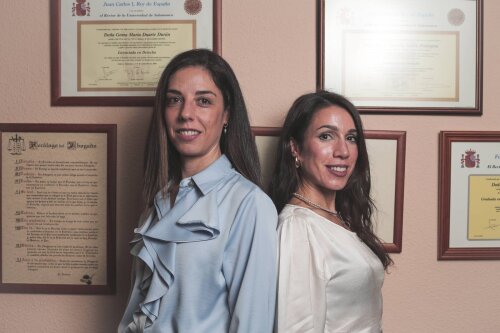Best Public-Private Partnerships (PPP) Lawyers in Madrid
Share your needs with us, get contacted by law firms.
Free. Takes 2 min.
List of the best lawyers in Madrid, Spain
About Public-Private Partnerships (PPP) Law in Madrid, Spain
Public-Private Partnerships (PPP) are collaborative arrangements between public entities and private sector companies designed to finance, construct, and operate projects such as infrastructure, services, and public facilities. In Madrid, Spain, PPPs play a crucial role in modernizing public assets, delivering public services more efficiently, and fostering economic growth by combining public oversight with private sector expertise and funding.
PPP law in Madrid is guided by both national and regional legislation, including European Union directives. These laws regulate how contracts are structured, the process of selecting private partners, risk allocation, and the ensuring of transparency throughout the project’s lifecycle. The legal framework encourages innovation while maintaining public interest and accountability in managing public resources.
Why You May Need a Lawyer
The complexities of PPP agreements mean that legal assistance is often essential for both public authorities and private entities. Here are some common situations where legal help is recommended:
- Drafting and negotiating PPP contracts to safeguard your interests
- Advising on regulatory compliance at the national, regional, and EU levels
- Handling tendering and bidding processes, including addressing competition and transparency requirements
- Resolving disputes that may arise during the execution of a PPP agreement
- Assessing financial, operational, and legal risks involved in complex infrastructure projects
- Navigating issues related to changes in project scope, delays, or unforeseen circumstances
- Protecting intellectual property and proprietary information in innovative PPP projects
- Ensuring environmental compliance and managing public consultations
Local Laws Overview
Public-Private Partnerships in Madrid are primarily regulated under Spanish national law, notably the Law on Public Sector Contracts (Ley de Contratos del Sector Público - LCSP), as well as local and regional regulations specific to the Community of Madrid. Additionally, European Union directives on public procurement and concessions directly apply. Key local legal aspects include:
- Strict procedures for tendering and awarding PPP projects to ensure transparency and equal treatment of bidders
- Specific requirements for drafting contracts, including dispute resolution mechanisms, financial terms, and project deliverables
- Rules for risk sharing between the public and private partners, especially regarding financing, construction, and operational risks
- Obligations for monitoring, performance assessment, and public accountability throughout the partnership
- Local norms regarding land use, environmental protection, urban planning, and public consultations within Madrid
Adherence to these local laws is critical to the success and legality of any PPP project in Madrid. Legal advice helps ensure that projects comply with all applicable legislation and that both parties are protected.
Frequently Asked Questions
What qualifies as a Public-Private Partnership (PPP) in Madrid?
A PPP is generally defined as a long-term contract between a public authority and a private sector entity for building or managing public infrastructure or services, where project risks and rewards are shared.
Who regulates PPPs in Madrid?
PPPs in Madrid are regulated by national and regional bodies, including the central government, the Community of Madrid’s authorities, and relevant local municipalities, with oversight from specialized public procurement agencies.
What types of projects can be developed through PPPs in Madrid?
Common projects include transportation infrastructure (roads, metro, airports), schools, hospitals, water treatment facilities, and technology services. Almost any public service or infrastructure could be considered under a PPP scheme if legislation permits.
How are PPP contracts awarded in Madrid?
PPP contracts are awarded through a competitive public procurement process. The procedure involves publishing a call for tenders, evaluating proposals based on pre-set criteria, and awarding the contract to the most suitable bidder.
What are the advantages of forming a PPP?
PPPs can accelerate project delivery, bring in technical expertise and private funding, spread financial risk, and encourage innovation in public services.
What risks are involved in PPP projects?
Risks can include financial shortfalls, delays, disputes over contract terms, regulatory compliance issues, and operational problems that may impact project delivery.
Are international companies allowed to participate in PPPs in Madrid?
Yes, international companies can participate, provided they comply with Spanish law, procurement requirements, and any specific eligibility criteria outlined in the procurement documents.
What happens if there is a dispute in a PPP contract?
Disputes are typically handled according to the procedures set out in the contract, which may include negotiation, mediation, arbitration, or litigation before Spanish courts.
Do PPP projects in Madrid require environmental impact assessments?
Yes, many PPP projects, particularly those affecting infrastructure and urban planning, must undergo environmental impact assessments in compliance with local and EU regulations.
How can a lawyer assist with a PPP project?
A lawyer provides valuable advice on legal strategy, regulatory compliance, risk management, contract negotiations, dispute resolution, and ongoing legal matters during the project lifecycle.
Additional Resources
If you need further guidance or legal advice about PPPs in Madrid, the following organizations and bodies can provide helpful information:
- Ministry of Transport, Mobility and Urban Agenda (Ministerio de Transportes, Movilidad y Agenda Urbana)
- Community of Madrid Public Procurement Office (Oficina de Contratación Pública de la Comunidad de Madrid)
- Official Chamber of Commerce, Industry and Services of Madrid (Cámara Oficial de Comercio, Industria y Servicios de Madrid)
- Spanish Council of Public Procurement (Consejo Consultivo de Contratación Pública del Estado)
- Madrid City Council (Ayuntamiento de Madrid), Department of Urban Development and Sustainability
- Relevant trade and industry associations focusing on infrastructure and public services
- Law firms and legal professionals specializing in public procurement and infrastructure law
Next Steps
If you are considering involvement in a PPP project in Madrid, Spain or if you are facing legal challenges related to a PPP, consider the following steps:
- Gather all relevant documentation regarding the PPP project or proposed partnership
- Identify your objectives, concerns, and any specific legal questions or issues
- Consult with a specialized lawyer or law firm experienced in PPP, public procurement, and infrastructure law in Spain
- Request a preliminary assessment to understand your legal position, risks, and opportunities
- Stay informed about changes in national and local laws affecting PPPs in Madrid
- Follow best practices for transparency, compliance, and stakeholder engagement throughout the PPP lifecycle
Taking these steps will help ensure your PPP project is legally sound, strategically planned, and positioned for successful implementation in Madrid.
Lawzana helps you find the best lawyers and law firms in Madrid through a curated and pre-screened list of qualified legal professionals. Our platform offers rankings and detailed profiles of attorneys and law firms, allowing you to compare based on practice areas, including Public-Private Partnerships (PPP), experience, and client feedback.
Each profile includes a description of the firm's areas of practice, client reviews, team members and partners, year of establishment, spoken languages, office locations, contact information, social media presence, and any published articles or resources. Most firms on our platform speak English and are experienced in both local and international legal matters.
Get a quote from top-rated law firms in Madrid, Spain — quickly, securely, and without unnecessary hassle.
Disclaimer:
The information provided on this page is for general informational purposes only and does not constitute legal advice. While we strive to ensure the accuracy and relevance of the content, legal information may change over time, and interpretations of the law can vary. You should always consult with a qualified legal professional for advice specific to your situation.
We disclaim all liability for actions taken or not taken based on the content of this page. If you believe any information is incorrect or outdated, please contact us, and we will review and update it where appropriate.

















